Amid Social Media Ban, Iran’s Labor Minister Buys Twitter Blue Service
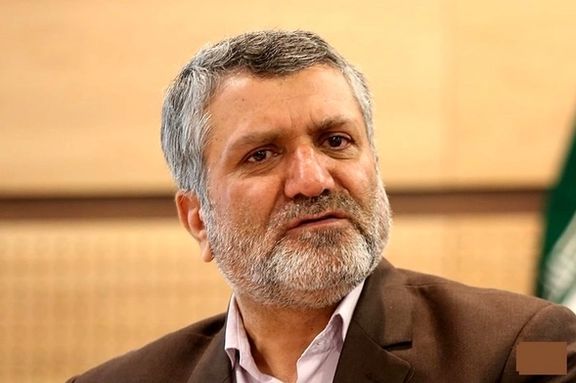
Despite Twitter and other social media being blocked by the Iranian government for all citizens, the country’s labor minister has now subscribed to Twitter Blue.

Despite Twitter and other social media being blocked by the Iranian government for all citizens, the country’s labor minister has now subscribed to Twitter Blue.
Twitter Blue is an opt-in, paid subscription that adds a blue checkmark to the account and offers early access to select features, like Edit Tweet.
Seyyed Solat Mortazavi, won a vote of confidence to become the Raisi administrations’ labor and social welfare minister in October 2022.
He replaced Hojjat Abdolmaleki who resigned in June 2022 under pressure from the media and the parliament as weeks of protests by pensioners and teachers across the country threatened political stability.
As protests in Iran began in mid-September 2022, the government blocked Instagram, the only international social media platform people were allowed to use.
Other platforms including Facebook and Twitter were banned after the 2009 presidential election and Telegram in the aftermath of the November 2019 protests.
Despite the bans, Iranian officials, including Supreme Leader Ali Khamenei are present on Twitter and some have more than one account on every platform. Ordinary Iranians also continue to use social media apps by paying for VPNs [Virtual Private Networks] that allow them to circumvent the ban. However, high-level officials have unrestricted internet access.
Social media has revolutionized the authoritarian information space in Iran. The government has lost its monopoly on information and desperately tries to control the Internet. Social media has become a town square where citizens gather to criticize and berate the clerical regime.
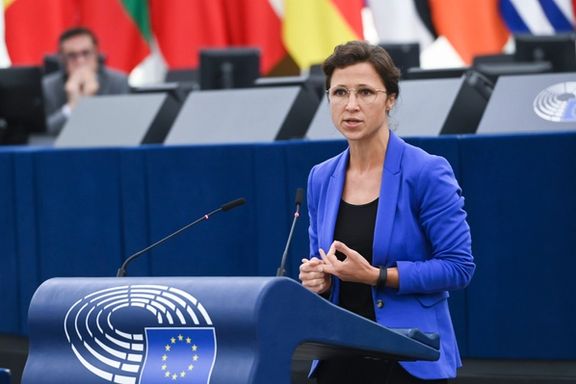
German member of European Parliament Hannah Neumann says the Iranian regime in a letter condemned her remarks against the president of the Islamic Republic.
In a letter to the Embassy of Sweden in Tehran, the Islamic Republic has asked the Swedish government in its capacity as the President of the Council of the European Union, to convey Iran’s protest to the relevant authorities of the European Parliament and the European Council.
In late May, Neuman protested the spiral of executions in Iran saying people, such as Ebrahim Raisi, got away with killing thousands and his impunity persists after decades.
Iran’s foreign ministry called the statement by Neumann regarding the impunity of President Ebrahim Raisi in the killing of thousands in the 80s “provocative and biased”.
“The anti-Iranian statements and activities of the stated individual, especially her latest provocations in recent months, lack legal legitimacy, they are based on distortion of reality and misinformation, they are far from rationality and political wisdom," read the letter published by Neumann on her Twitter Saturday.
Raisi is accused of having had a direct role in executing thousands of political prisoners in 1988.
“Accusing a President, who was elected by the majority of the Iranian citizens, in a democratic process in a free election, is simply a showcase of an illegitimate and of course a failed political agenda, which is unfortunately linked to the current Iran phobia trend in Europe,” the Iranian Foreign Ministry wrote in the letter.
Elections in Iran are not free or competitive, as most candidates are rejected by regime's pre-screening process.

Prime Minister Benjamin Netanyahu's national security adviser said on Friday that Israel is not close to attacking Iran's nuclear sites.
Israel's main ally the United States has been holding talks with Iran in recent weeks in an attempt to outline steps that could limit Teheran's nuclear program and de-escalate tensions. Tzachi Hanegbi said it is still unclear what will come of those talks.
Hanegbi told Channel 13 television that no agreement could obligate Israel which views Iran's nuclear capability as an existential threat. Asking whether Israel had made a decision on a preemptive strike, Hanegbi replied:
"We are not getting closer because the Iranians have stopped, for a while now, they are not enriching uranium to the level that in our view is the red line."
"But it can happen. So we are preparing for the moment, if it comes, in which we will have to defend the people of Israel against a fanatic regime that is set on annihilating us and is armed with weapons of mass destruction."
Iran has ramped up enrichment to 60-percent purity since 2021, which is below the bomb-grade 90-percent level Netanyahu has set as a "red line".
Iran denies that it has nuclear weapons ambitions, which was the reason for the 2015 agreement that limited the country’s uranium enrichment.
As soon as Donald Trump ditched the nuclear deal in 2018, he reimposed crippling sanctions on the Iranian economy. Tehran responded by a gradual move beyond the deal's enrichment restrictions.

US House Foreign Affairs Committee Chairman Rep. Michael McCaul has demanded more information from the White House about the status of US Iran envoy Rob Malley.
Iran International first reported Thursday that Malley has long been absent from his job and his security clearance status was under review. The State Department after hours of delays finally admitted that Malley had been on leave. Quickly information emerged that on the same day his paid leave had turned into “unpaid leave.”
“Media reports indicate that Special Envoy for Iran, Robert Malley, was placed on unpaid leave after his security clearance was suspended earlier this year amidst an investigation into potential mishandling of classified documents,” the HFAC chairman wrote. “These reports raise serious concerns both regarding Malley’s conduct and whether the State Department misled Congress and the American public.”
Malley had been conspicuously absent from a Congressional briefing in May and the State Department had said that he was on personal leave due to the illness of a family member. The question remains as to why the administration did not tell the truth to Congress about his security clearance issue.
Malley’s deputy Abram Paley has already been appointed as acting Iran envoy by the State Department.

Many suspect that as the administration was holding secret talks with Islamic Republic of Iran in Oman and perhaps elsewhere, they did not want Malley’s issue to come into the open, since he has been at the forefront of President Biden’s efforts to make a new deal with Tehran.
“The Department’s failure to inform Congress of this matter demonstrates at best a lack of candor, and at worst represents deliberate and potentially unlawful misinformation,” the chairman continued. “Given the gravity of the situation, it is imperative that the Department expeditiously provide a full and transparent accounting of the circumstances surrounding Special Envoy Malley’s clearance suspension and investigation and the Department’s statements to Congress regarding Special Envoy Malley.”
Iranian Americans have been urging lawmakers to demand answers on this issue and also on reports about the administration trying to make a deal with Iran that would release billions of dollars in frozen money for release of three individuals held in Iran as leverage against the United States.
Earlier this week, before the news about Malley’s absence surfaced Iranian American activists sent a letter to McCaul asking him to subpoena Malley over his history of secret engagements with high-ranking Islamic Republic regime officials with ill will towards the US, as well as his intent on pursuing a policy of appeasement in favor of the biggest state sponsor of terrorism.
“Mr. Malley’s conduct is not acceptable to us as Americans of Iranian origin, especially while we witness people inside Iran being slaughtered by the regime in the streets and tortured in prisons by the Islamic Revolutionary Guard Corps, a US-designated terrorist organization,” read the letter.
Some have commented that Malley is a childhood friend of Secretary of State Antony Blinken and this might have been a factor in keeping the reason for his absence out of public view.
United Against Nuclear Iran (UANI), an advocacy group, also called Friday for a Congressional investigation regarding lack of transparency by the White House over Malley’s suspension.
“It is imperative that the Biden administration disclose how long it has withheld from Congress that consequential diplomatic engagements have been led by someone other than Mr. Malley and when the alleged mishandling of classified information took place, a statement issued Friday by UANI said.
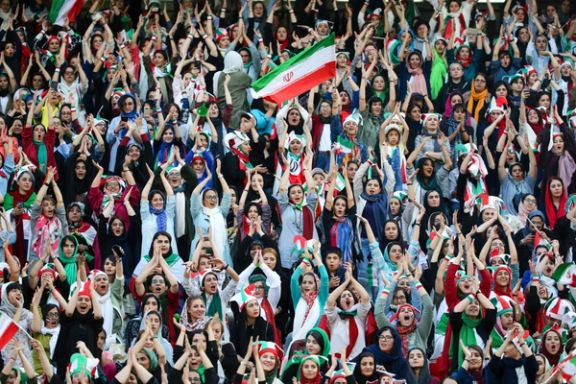
Iran's National Security Council has decided that women can from now on attend soccer matches in stadiums, but security bodies are still deliberating the details.
Announcing the news Friday, Mehdi Taj, chairman of Iran's football federation, said a taskforce consisting of the ministries of interior and sports, the federation and “two security bodies” has been set up to decide about the manner of implementing the potentially groundbreaking decision.
The world’s soccer authority (FIFA) has tried to convince the Islamic Republic for nearly a decade to lift the unwritten ban on women attending stadiums to watch male players.
In some instances, authorities have allowed women on a limited scale to watch some matches at the stadium in the past few years but since March 2022 the ban has been reimposed despite FIFA’s insistence on allowing unrestricted access to stadiums to women.
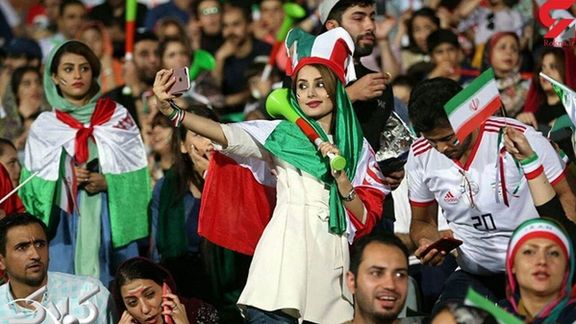
This scenario can repeat itself, whereby the government would allow a few thousand women to enter a stadium just to show to FIFA that there is no ban.
In March 2022, hundreds of women who had purchased tickets online to watch the World Cup qualifier between the national team and Lebanon in the religious city of Mashhad were refused entry.
The women were tear-gassed and pepper sprayed by security forces when they insisted that they had the right to watch the game and protested. Several women were reportedly injured in the incident.
Without apologizing for the violence against women, Iran's football federation blamed “ticket forgers” and women who it accused of lying about their gender at the time of the purchase of online tickets.
Although Iran won the game 2-0, thereby qualifying for the World Cup in Qatar, in an unprecedented turn of events, some Iranians urged FIFA to bar their country from the tournament.
Consequently the #Fifabaniri (FIFA ban Islamic Republic of Iran) and similar hashtags rose to the top of most-used hashtags in Persian-language Twitter at the time.
"FIFA's position … is clear: historic progress has been achieved – as exemplified by the milestone in October 2019, when thousands of women were allowed into the stadium … and more recently when some women were allowed again at the FIFA world Cup qualifier match in Tehran in January – and FIFA expects this to continue, as there can be no turning back," FIFA said in a statement after the incident.
There is little doubt that FIFA has been lenient over the years and the Iranian regime has played around with the international federation, by sometimes allowing a small group of women, even handpicked, to watch a game.
The Islamic Republic has banned female spectators from football stadiums for over four decades. Iranian officials argue that male football fans swear profanities, so the atmosphere of stadiums is not suitable for women even if they are seated in a different part of the stadium.
The ban has led to arrests, beatings, detentions, and abuses against women.
In 2005 a group of Iranian women for the first time defied the ban and managed to get into a stadium in Tehran to watch a World Cup qualifier match between Iran and Bahrain. The clerical establishment was outraged by the incident and used it as an excuse to attack the reformist government of President Mohammad Khatami.
The renowned director Jafar Panahi made Offside, a film about the incident which won the Sliver Bear at the Berlin International Film Festival in 2006.
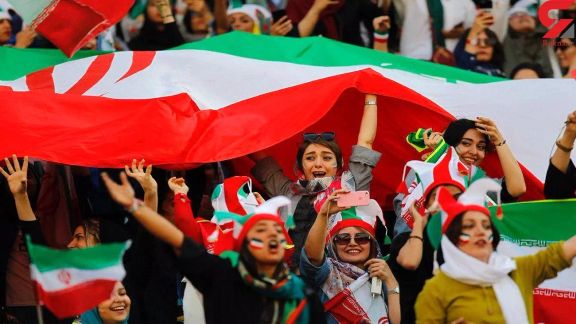
Female fans had to wait until October 2019 to be allowed to enter a soccer stadium in limited numbers when authorities had to relent under pressure from FIFA, which threatened to penalize the Iranian federation for gender discrimination.
In September 2019, a female football fan, Sahar Khodayari, who came to be known as the “Blue Girl” after her favorite team, Esteghlal FC, was reportedly sentenced to jail for trying to enter a stadium disguised as a man. She died by self-immolation, causing a domestic and international outcry.
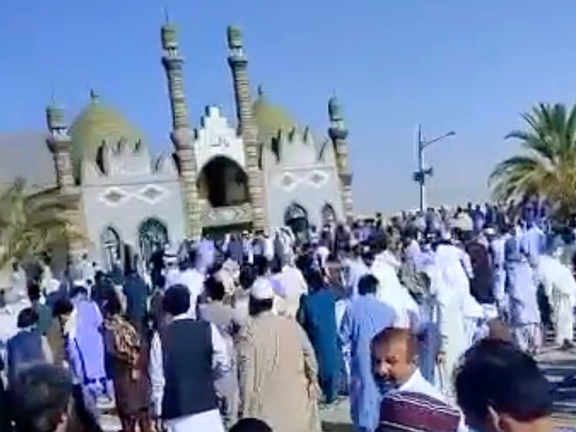
The city of Zahedan was the scene of another round of rallies, but this Friday the demonstrators were silent as security forces were swarming the streets.
In addition to the large presence of security forces, the 39th consecutive week of protests was a little different as a lot of people have been arrested since last week, when the regime intensified its crackdown and the campaign against the city’s prominent Sunni leader Mowlavi Abdolhamid.
A website, which covers developments in Sistan-Baluchestan Province, published several videos and photos of plainclothes agents in cars across the city, with reports of several arrests.
Unlike previous weeks, Abdolhamid did not lead the Friday prayers and was substituted by Mowlavi Abdolghani Badri, interim Friday imam. However, Abdulhamid's office announced that the decision was made because the senior cleric led a similar event and delivered his sermon for the Muslim holiday of Eid al-Adha (Feast of the Sacrifice), in which he also asked his followers not to chant slogans to honor the occasion of the Eid.
Although people followed his order, the walls of the city were covered with political graffiti, themed around expressing support for Abdolhamid, decrying the regime’s persecution of the religious and ethnic Baluch minority in the province, and remembering Bloody Friday.
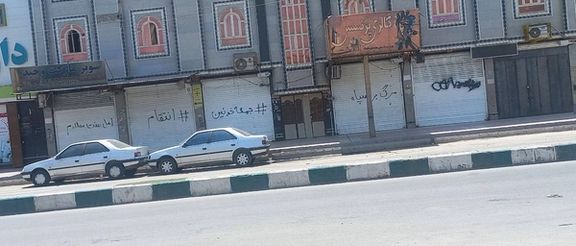
Justice for the tragic incidents on September 30, 2022, known as Bloody Friday, has been a recurring demand during protest rallies in the province, also reflected regularly in Abdolhamid’s Friday prayer sermons. According to different reports, security forces killed 80 to 100 people, including women and children, on the day.
In the past few weeks, the regime has intensified pressure on the outspoken cleric, arresting several people from his inner circle and his supporters as well as preventing him from leaving Iran for the annual Hajj pilgrimage in Saudi Arabia.
His grandson and several aides have been arrested since last week. The Makki Mosque, Abdolhamid's headquarters in Zahedan has been a center of resistance to the government since popular protests began in September 2022. This is where Abdolhamid delivers his weekly sermons, openly criticizing the regime headed by Supreme Leader Ali Khamenei.
The arrests came a few days after reports surfaced that the Revolutionary Guard’s intelligence arm had assigned a hitman to poison and kill the vocal Sunni cleric. The security guards at Makki Mosque arrested a man pretending to be a religious student who allegedly wanted to assassinate the Sunni leader.
According to the report, the suspect admitted that he received a salary of 150 million rials ($300) per week since the beginning of the operation.
Officially known as Sheikh Abdolhamd Esmailzehi, the Sunni cleric is widely popular because of his willingness to challenge Khamenei’s absolute authority. In addition, the country's Sunni minority is systematically discriminated against and the cleric has long been an advocate of minority rights, to the ire of the regime.
During his speech for the Eid al-Adha prayer on Thursday, Abdolhamid again slammed the regime for its atrocities against protesters, especially in the Bloody Friday incident, and decried the country’s judiciary for lack of independence and corruption.
"The judiciary should not be affected by politics", he said, noting that this institution should be a "refuge for the people” but judges follow orders from others, referring to security forces.
"Unfortunately, corruption has taken root in the country today, and the judicial system is no exception... The fight against corruption requires a new mechanism," he added.
He also criticized the authorities for preventing several people in his circle from traveling to Saudi Arabia for Hajj, saying that "I am not complaining about being banned, but the people who were with me, who were neither political nor famous, were sent back from the airport, which is against the text of the Quran."